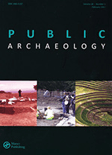
Public Archaeology
Scope & Guideline
Transforming Archaeology into a Community Conversation
Introduction
Aims and Scopes
- Community Engagement and Participation:
The journal emphasizes the importance of involving the public in archaeological practices, exploring various models of community-based heritage management and participatory archaeology. - Ethical Considerations in Archaeology:
There is a strong focus on the ethical implications of archaeological work, particularly in relation to the treatment of human remains, identity, and privacy. - Critical Heritage Studies:
The journal explores critical approaches to heritage, examining how heritage can be both a resource for development and a site of conflict, especially in contested landscapes. - Public Perception and Education:
The role of public archaeology in shaping perceptions of the past and its educational potential is a core area of interest, with studies addressing how archaeology can influence public understanding and engagement. - Digital and Media Engagement:
The journal investigates the use of digital tools and media in public archaeology, including how these platforms can enhance accessibility and broaden participation in archaeological discourse.
Trending and Emerging
- Ethics in Archaeology:
There is a rising trend in addressing ethical considerations in archaeological practice, particularly regarding the display and management of human remains and the implications of identity and privacy. - Community-Based Heritage Management:
Recent studies increasingly focus on the role of communities in managing their heritage, emphasizing participatory approaches that empower local voices and experiences. - Heritage and Social Justice:
Emerging themes highlight the relationship between heritage and social justice, examining how archaeology can address issues of inequality, representation, and the impacts of nationalism. - Digital Engagement in Archaeology:
The use of digital platforms for public engagement is on the rise, with innovative tools being developed to enhance accessibility and dissemination of archaeological knowledge. - Wellbeing and Archaeology:
An increasing number of publications explore the therapeutic aspects of engaging with the past, highlighting the role of archaeology in promoting wellbeing and emotional connection to heritage.
Declining or Waning
- Traditional Archaeological Methodologies:
There appears to be a decreasing emphasis on traditional archaeological methodologies in favor of more innovative and participatory approaches. This shift reflects a broader trend towards engagement and ethics rather than purely methodological concerns. - Historical Archaeological Narratives:
While historical narratives remain important, there is a noticeable decline in papers focusing solely on historical archaeological interpretations, particularly those that do not engage with contemporary social issues or public engagement. - Colonial Archaeology:
Although colonial archaeology has been a significant area of focus, recent publications suggest a waning interest in this theme, potentially as researchers move towards examining current implications of heritage and identity rather than historical colonial contexts.
Similar Journals

Archeologia e Calcolatori
Pioneering Research in Archaeology and Computational TechniquesArcheologia e Calcolatori is a distinguished open-access journal published by EDIZIONI ALL INSEGNA GIGLIO SAS in collaboration with the Italian National Research Council, dedicated to advancing knowledge in the fields of archaeology and its intersections with computational methodologies. Since its inception in 1998, the journal has become a pivotal resource for researchers and practitioners, offering a platform for innovative studies and critical discussions at the forefront of archaeological science. With its current impact reflected in Scopus rankings, Archeologia e Calcolatori is placed in Q2 for both Archaeology and Archaeology (Arts and Humanities), and its commitment to quality scholarship is evident. The journal benefits from open access, ensuring that scholarly findings are readily available to a global audience. By prioritizing the dissemination of interdisciplinary research methods and explorative analyses, it aims to foster collaboration and inspire new directions in archaeological and computational research.

Virtual Archaeology Review
Empowering Knowledge Sharing in Virtual Archaeology.Virtual Archaeology Review, published by UNIV POLITECNICA VALENCIA, EDITORIAL UPV, is a distinguished open-access journal dedicated to the dynamic fields of archaeology and conservation. Based in Spain, this journal has made a significant impact in the academic community, reflected in its outstanding Q1 ranking in Archeology and Conservation for 2023, alongside impressive standings in related disciplines such as Computer Science Applications. With an active commitment to promoting the accessibility of knowledge since 2010, it provides a platform for researchers, professionals, and students to share innovative findings and methodologies in virtual archaeology, fostering collaboration across disciplines. The journal's impact factor and its strategic focus on advancing the practice of virtual methodologies in archaeology underscore its vital role in bridging technology and heritage studies. By embracing a multidisciplinary approach, Virtual Archaeology Review not only enhances academic discourse but also drives the development of effective conservation strategies, making it an essential resource for those dedicated to the preservation and appreciation of our cultural heritage.
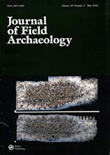
JOURNAL OF FIELD ARCHAEOLOGY
Transforming Archaeological Inquiry into Impactful KnowledgeJOURNAL OF FIELD ARCHAEOLOGY, published by Routledge Journals, Taylor & Francis Ltd, is a premier scholarly publication dedicated to advancing the field of archaeology. With an impressive impact factor reflecting its significant contributions to both the arts and humanities, this journal ranks in the Q1 category for archaeology, with a remarkable position of #21/413 in the arts and humanities realm and #19/354 in social sciences, placing it in the 95th percentile among its peers. Catering to researchers, professionals, and students alike, the journal has continuously explored critical archaeological questions since its inception in 1974, with a commitment to disseminating high-quality research and innovative methodologies up to the present. Although it operates under a traditional access model, the journal engages a broad readership with its insightful studies and findings, making it an essential resource for anyone deeply involved in archaeology and its related disciplines.
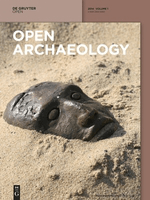
Open Archaeology
Preserving Heritage, Sharing InsightsOpen Archaeology is a distinguished open-access journal dedicated to publishing high-quality research in the fields of archaeology, conservation, and education. Since its inception in 2015, the journal has established itself under the esteemed publication of DE GRUYTER POLAND SP Z O O, experiencing rapid growth and recognition, culminating in a Q1 ranking in both Archaeology and Conservation categories as of 2023. Based in the vibrant academic environment of Poland, Open Archaeology caters to a global audience, illustrated by its Scopus rankings which position it 16th in Conservation and 69th in Archaeology, showcasing its significant impact in the arts and humanities sphere. The journal aims to foster interdisciplinary discourse and disseminate innovative research findings to enhance understanding and preservation of cultural heritage. With an unwavering commitment to open access, it encourages widespread dissemination of knowledge, making it an invaluable resource for researchers, professionals, and students alike.
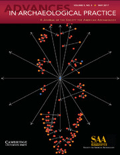
Advances in Archaeological Practice
Advancing Knowledge Through Innovative Archaeological PracticesAdvances in Archaeological Practice, published by Cambridge University Press, is a leading journal in the field of archaeology, emphasizing innovative approaches and methodologies that advance archaeological research. With an ISSN of 2326-3768 and a commendable Q1 ranking in both the Arts and Humanities and Social Sciences categories, the journal effectively bridges theoretical perspectives and practical applications, positioning itself at the forefront of archaeological scholarship. Researchers and professionals can benefit from its high-impact content, reflected in its 93rd percentile ranking in the field, making it an essential resource for those aiming to stay abreast of the latest insights and practices. Although it operates under a subscription model, the quality and relevance of its publications ensure it plays a crucial role in shaping the discourse within the archaeological community and beyond, facilitating access to cutting-edge research that enhances our understanding of past human activities.
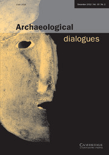
Archaeological Dialogues
Connecting Scholars Through Groundbreaking Archaeological InsightsArchaeological Dialogues is a premier journal published by Cambridge University Press that serves as a vital forum for innovative discourse in the field of archaeology. Established in 1994, this journal has excelled in fostering scholarly communication and is recognized with a prestigious Q1 ranking in both Archaeology and Arts and Humanities, highlighting its significant impact in these domains. With an impressive impact factor, the journal commands a strong presence in the academic community, as reflected in its Scopus rankings, where it is positioned in the top 25% for archaeology and arts and humanities disciplines. Archaeological Dialogues seeks to explore diverse perspectives and methodologies in archaeology, offering researchers, professionals, and students invaluable insights into contemporary issues and debates. While not an open-access journal, it remains accessible through institutional subscriptions, ensuring that groundbreaking research reaches a broad audience engaged in the ever-evolving landscape of archaeological study. Located in the United Kingdom, this journal not only promotes interdisciplinary connections but also plays a pivotal role in shaping the future of archaeological research and discussion.

Bulgarsko e-Spisanie za Arkheologiya-Bulgarian e-Journal of Archaeology
Connecting scholars to the past, present, and future of archaeology.Bulgarsko e-Spisanie za Arkheologiya - Bulgarian e-Journal of Archaeology is a prominent open-access journal published by the ASSOC BULGARIAN ARCHAEOLOGISTS since 2011, serving as a vital platform for the dissemination of archaeological research and findings in Bulgaria and beyond. With the ISSN 1314-5088, this journal is dedicated to advancing knowledge in the field of archaeology, facilitating the sharing of innovative studies, fieldwork results, and theoretical discussions. It is particularly significant for researchers, professionals, and students who are interested in the archaeological heritage of Bulgaria, providing an accessible venue for high-quality scholarly contributions. The journal's commitment to open access ensures that its rich repository of knowledge is available to a global audience, enhancing collaboration and fostering new discoveries within the discipline.

Revue Archeologique du Centre de la France
Connecting Histories: Central France's Archaeology at Your FingertipsRevue Archeologique du Centre de la France is a prestigious academic journal dedicated to the field of archaeology, with a special focus on the rich historical and cultural heritage of central France. Published by FED EDITION REVUE ARCHEOLOGIQUE CENTRE FRANCE, this journal has been an open-access platform since 2004, ensuring that researchers, professionals, and students can freely access cutting-edge archaeological findings and scholarly discussions. With an acute emphasis on disseminating knowledge and fostering ongoing dialogue in archaeology, Revue Archeologique du Centre de la France serves as a vital resource for those keen to explore the complexities of French archaeological studies. Housed in Tours, this journal not only highlights regional heritage but also situates it within broader archaeological frameworks, making it an essential contribution to the field. Researchers can look forward to engaging with a diverse array of articles that cover both theoretical and applied aspects of archaeology, bolstering the understanding of our shared past.
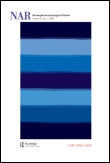
Norwegian Archaeological Review
Diving Deep into Archaeological NarrativesNorwegian Archaeological Review, published by Routledge Journals, Taylor & Francis Ltd, is a leading interdisciplinary journal that has made significant contributions to the field of archaeology since its inception in 1968. With an impressive Q1 ranking in the Arts and Humanities category for archaeology and an 86th percentile ranking in Scopus, this journal serves as a crucial platform for showcasing innovative research that advances our understanding of human history and cultural heritage. The Review provides a diverse range of scholarly articles, critical reviews, and thoughtful discussions, making it an essential resource for researchers, professionals, and students alike. While the journal currently does not offer an open-access option, it continues to maintain high editorial standards and relevance within the academic community, with publication converging up to 2024. The Norwegian Archaeological Review thrives as a nexus for academic discourse, encouraging the exploration of archaeological methodology, theory, and practice against the backdrop of contemporary global challenges.
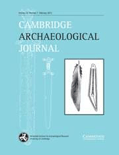
CAMBRIDGE ARCHAEOLOGICAL JOURNAL
Illuminating the Past, Inspiring the FutureThe Cambridge Archaeological Journal, published by Cambridge University Press, is a premier academic journal dedicated to archaeology and cultural studies. With an ISSN of 0959-7743 and an E-ISSN of 1474-0540, it has established itself as a leading platform since its inception in 1991, showcasing groundbreaking research that significantly contributes to our understanding of human history and cultural heritage. The journal currently ranks in the top quartile (Q1) across various categories, including Archaeology and Cultural Studies, underlining its impact and relevance in the field. The impact factor reflects its esteemed position, with Scopus ranks placing it within the 90th to 93rd percentiles among its peers. Researchers, professionals, and students alike benefit from its insightful analyses and interdisciplinary approaches, making it an essential resource for advancing knowledge in archaeology and related fields. The journal is based in the United Kingdom, at the Edinburgh Building, Shaftesbury Rd, CB2 8RU, Cambridge, England, and continues to drive scholarly conversations through its commitment to excellence and innovation in archaeological studies.